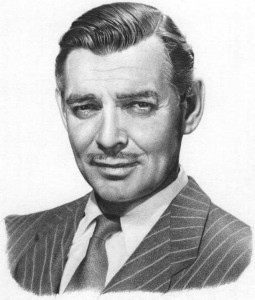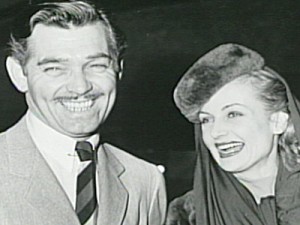 Over the weekend I devoured Lyn Tornabene’s 1976 biography of Clark Gable, entitled Long Live the King. Gable has always been a difficult persona to capture in the written form. I read another bio many years ago, the name and author of which escapes me, which perhaps is an indication of its quality.
Over the weekend I devoured Lyn Tornabene’s 1976 biography of Clark Gable, entitled Long Live the King. Gable has always been a difficult persona to capture in the written form. I read another bio many years ago, the name and author of which escapes me, which perhaps is an indication of its quality.
Even if one peruses the Amazon listings there are few works devoted to Gable, and even fewer which in the end result in the reader’s applause. There are many reasons for this, perhaps most importantly is that Gable gave extremely few interview during the majority of his career. For the most part, these were either very early on in his career or after he had parted ways with his studio – MGM.
Tornabene’s work, although lengthy, lacks depth. Perhaps depth simply isn’t available here. My battered copy runs 423 pages, in which one would presume to learn something of the man to which such verbosity is devoted. However, after reading again (for perhaps the third time) I am still left without a greatly improved understanding of the man who was King BE. (That’s King, Before Elvis.)
Most importantly to me when reading these works is the professional story, with a few sprinklings of personal life included. My interest lies in the films, reflections on how they were made, contract negotiations, various professional pressures. Extra marital affairs, boozing, and the like are really secondary, although in some rare instances they need a larger role. For example a biography of legendary drunk Robert Newton would be amiss should it not include significant verbage on his love of spirts.
Long Live the King really just doesn’t cut it. Here Gable seems to move through time, picture to picture, without comment. Even Gone with the Wind and It Happened One Night, two of Gable’s most famous pictures, do not get more than token aknowledgement. Rather, it seems we are treated to the varying changes in the decor of his ranch. These may well be significant, but not at the expense of his immense filmography.
 Although I really would like to have seen more emphasis on his professional activities, Tornabene does do an admirable job in relaying the close connection Gable had with his third and most famous wife, Carole Lombard. One not only feels but can sorely sympathize with Gable’s grief and the permanent changes which this left in him. In a nice touch, the Gable’s following wives are woven into the narrative not only on their own merit, but also in relation to Lombard and her legacy in the Gable household.
Although I really would like to have seen more emphasis on his professional activities, Tornabene does do an admirable job in relaying the close connection Gable had with his third and most famous wife, Carole Lombard. One not only feels but can sorely sympathize with Gable’s grief and the permanent changes which this left in him. In a nice touch, the Gable’s following wives are woven into the narrative not only on their own merit, but also in relation to Lombard and her legacy in the Gable household.
Granted, more recent works on Gable may well include (as they should at this point) the child he fathered with Loretta Young but there still remains to be a definitive book written on the man who ruled cinema for twenty years. Marginally recommended.
Your criticism of “Long Live The King” is somewhat justified. One would like to see more emphasis on Gable the actor, his work, and the influence he had in changing how males were portrayed in Hollywood film (you could argue that he and James Cagney, who arrived on the scene at just about the same time, spelled the definite end of the Valentino-Novarro-Gilbert style of acting, though it might not have carried over into the age of talking pictures, not to mention the stock-market crash and ultimately the Depression, and Gable and Cagney were there to fill the void). This failure to recognize Gable the actor and his work is as similarly frustrating as books on Frank Sinatra that focus on him as a film star and pay relatively little attention to his groundbreaking work as a pop/jazz vocalist.
I’m enjoying this blog, and I cordially invite you to visit, and join, my community dedicated to Gable’s third wife, Carole Lombard, and classic Hollywood in general. It’s called “Carole & Co.”, has been up since mid-2007, and can be found at http://community.livejournal.com/carole_and_co.